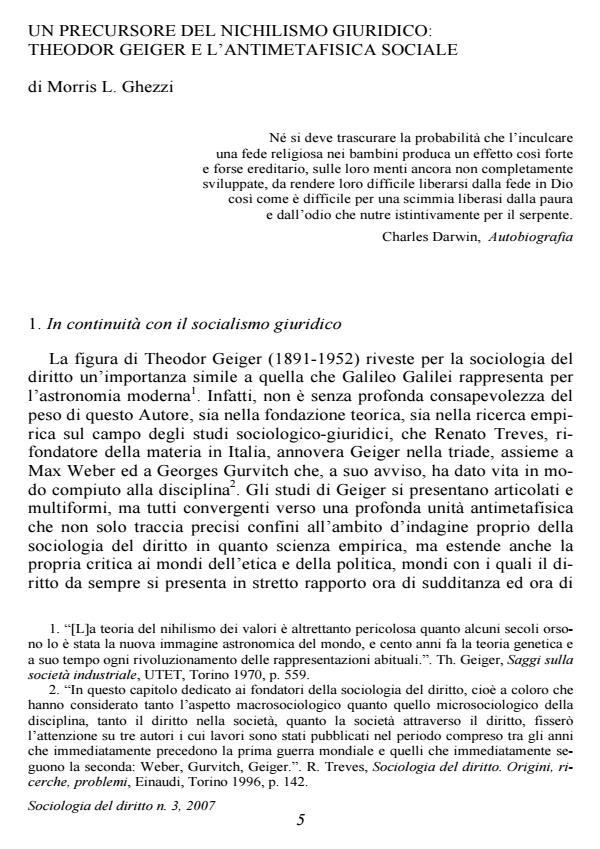A Forerunner of Legal Nihilism. Theodor Geiger and Social Anti-metaphysic
Journal title SOCIOLOGIA DEL DIRITTO
Author/s Morris L. Ghezzi
Publishing Year 2008 Issue 2007/3 Language Italian
Pages 41 P. 5-45 File size 245 KB
DOI
DOI is like a bar code for intellectual property: to have more infomation
click here
Below, you can see the article first page
If you want to buy this article in PDF format, you can do it, following the instructions to buy download credits

FrancoAngeli is member of Publishers International Linking Association, Inc (PILA), a not-for-profit association which run the CrossRef service enabling links to and from online scholarly content.
Theodor Geiger’s socio-legal thinking constitutes a critical continuum with that of late nineteenth century legal socialism. In particular, Geiger, whom Renato Treves numbered among the founders of modern sociology of law, developed a close-knit analysis of the Marxist theory of law, highlighting how law becomes a focal factor in social transformation in democratic societies of the kind that are governed by the consent expressed by universal suffrage of the population practised at regular intervals. Revolutionary socialism could and had to give way to reform socialism, he argued, on the road to the libertarian and egalitarian emancipation of weaker social groups. Geiger was educated in Germany at an exceptionally dramatic time in history, as the Weimar Republic stumbled to an end and the era of National Socialism dawned. That development forced him to go into exile, first in Denmark and later in Sweden, where he came into direct contact with the Uppsala school, in particular with Axel Hägerström: it was in this context that he developed the salient characteristics of his antimetaphysical thinking. He was then to develop this school’s theoretical nihilist thinking until he exceeded it with practical nihilism, which did not stop at just denouncing the falseness of all values, but went further to discourage their use, because of the irrational emotivity they may trigger. Geiger’s nihilism of values therefore paved the way for a precise form of legal nihilism, which encourages the construction of a sober democracy, i.e. one that is capable of raising conflict to the intellectual level and of anaesthetising feelings, as it is aware of its own inability to make any proclamation of value, ethics or policy about the nature of truth.
Morris L. Ghezzi, Un precursore del nichilismo giuridico. Theodor Geiger e l'antimetafisica sociale in "SOCIOLOGIA DEL DIRITTO " 3/2007, pp 5-45, DOI: